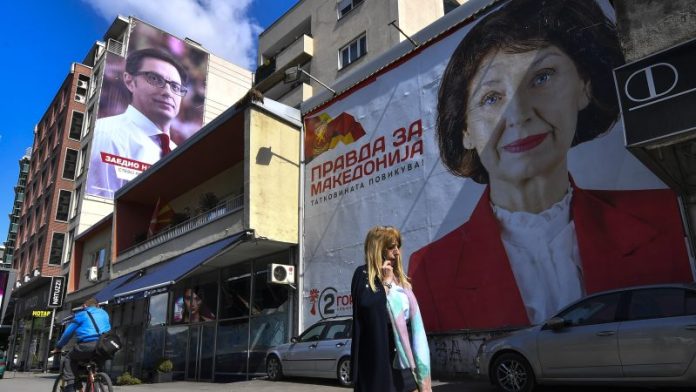Seven candidates will compete in the first round of North Macedonia’s presidential election on April 24, with the ruling Social Democrats (SDSM) and the opposition conservative VMRO-DPMNE believed to be frontrunners to reach the second round, according to bne IntelliNews.
While many see the vote as an indicator of public opinion on European integration processes, it is also expected to reflect dissatisfaction with the current policies of the ruling SDSM alliance with the Albanian Democratic Union for Integration (DUI).
After the COVID-19 pandemic and energy crisis, North Macedonia is facing double-digit inflation and emigration of young people to European countries, which aggravates labour shortages. Critics blame SDSM’s partnership with DUI for what they call mismanagement. Many argue that Albanians are overrepresented in state institutions, with Macedonian interests being sidelined.
Since 2017, the government has made painful concessions, such as changing the country’s name to “North Macedonia” in line with Greek demands, to fulfil NATO and EU membership requirements. However, while NATO membership was secured in 2020, Bulgaria has since put forward its own demands for the country to negotiate EU membership.
As a result of the succession of crises, many citizens no longer desire full EU membership, but instead favour a return to fundamental values, economic growth, democratic processes, the rule of law and the fight against corruption and nepotism. Many argue that these ideals have been overlooked amid the country’s efforts to meet Bulgaria’s conditions.
One of the key issues raised during the presidential debate was the constitutional changes demanded by Bulgaria, which the ruling coalition failed to get through parliament.
Stevo Pendarovski, the incumbent president seeking a second term, stated that he considered European integration to be the key point for North Macedonia. He was supported by the DUI candidate, Foreign Minister Bujar Osmani, who reiterated that amending the constitution represented the last requirement for the country to achieve full EU membership.
However, his rivals noted that Bulgarian officials had hinted at the introduction of new conditions, suggesting that the cycle of requirements could be perpetual.
Opposition VMRO-DPMNE candidate Gordana Siljanovska-Davkova, a law professor, stated that there was a chance to make changes to avoid amending the constitution. A candidate from the minor opposition Left party, Biljana Vankovska, emphasised the detrimental impact of agreements signed by the former administration, such as the Prespa Agreement with Greece and the Good Neighbourhood Agreement with Bulgaria.
While the EU accession process and the performance of the current government were the main issues of the campaign period, presidential candidates also sought support on other issues, including attracting investment and creating jobs for youth.
The second round of the presidential election is scheduled for May 8, coinciding with the general election vote.
